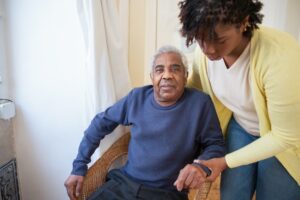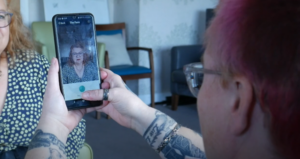DiSC programme menu » DiSC homepage | Projects | Meet the team and contact | Events | Annual Review

New technology is helping to change the face of social care for people across Bedford, Central Bedfordshire, Luton and Milton Keynes, to improve care and enable people to stay independent in their own home for as long as possible.

Strategic Delivery Plan 2025-27
March 2025 marked the conclusion of the original three-year national Digitising Social Care (DiSC) programme, and now we are helping to shape and inform the next chapter. Having been recognised as one of the most successful DiSC programmes nationally, we have been supporting NHS England in developing the forthcoming national programme.
Last year we made significant progress in delivering and evidencing outcomes through a variety of pilot projects which have benefitted residents, care providers and the wider system. For details, see the Annual Review webpage.
We plan to continue shaping the future of technology in social care – exploring and supporting innovative solutions that will benefit the independence and wellbeing of our residents, along with the sustainability of our care market.
Our strategic aims
- Maximising use of existing technology – Delivering the current pilot projects and promoting the benefits of care technology.
- Sustainability – Supporting wider system discussions to manage the ongoing sustainability of pilot projects that have come to an end.
- Supporting funding reforms at a local and national level – Tackling the disconnect between costs falling to community and social care services where benefits are realised in health services.
- Encouraging collaboration and innovation – Continuing to foster collaboration between stakeholders, including government agencies, local authorities, technology providers, social care providers, and service users themselves.
- Helping to shape and test the national direction with local strategies and priorities – Either by exploring the potential for new pilots, or embedding and scaling care technology into locally commissioned care pathways and processes.
- Optimising return on investment – Ensuring that strong evaluations feed into informed decisions about future investment.
How we will do this
- Engage the input of local authority partners, care providers and residents.
- Understand the challenges before developing solutions.
- Use knowledge of local needs and priorities to influence and inform national strategy.
- Align with our partners’ plans and initiatives.
- Promote the evidence and benefits of care tech to nurture engagement.
- Preparatory work to ensure people are ready to accept change and are empowered through collaboration to pursue ventures that are valued across the BLMK local authority footprint.
- Develop solutions and improve data sharing to assist with evidencing the impact of early intervention through care technology.
- Form a strategic design group to foster a supportive national involvement in steering BLMK and vice versa.
How will the DiSC programme help?
- Safer care – Bringing social care and health data and care records together in one place reduces the risk of errors, duplication and lost information. It also enables automated alerts and reminders for carers.
- Improved resident care – People will get better care that’s built around their needs. That’s because care staff will have the information they need, when they need it – and people who use services and their carers will be more involved in the conversations that count.
- More time to care – The reduced administration and more automated processes will increase productivity and release time to care – resulting in better experiences for residents and more meaningful interactions.
- Remote monitoring – Using digital tools to measure vital signs removes the need for frequent check-ups or disturbances to daily routines. It enables residents to stay in their own home for longer – safe in the knowledge that medical teams will know if issues arise and react accordingly.
- Falls prevention – Fewer people will fall and suffer from any injuries – whether they live in their own home or residential care.
- Better communication – Streamlined processes and faster decision-making – care staff can contact clinicians quickly to discuss any concerns or trends such as weight loss or changes to vital signs.
- Reduced pressure on ambulances – There will be less need to call ambulances, as people receiving residential care or home support will become safer and have more technology to help them stay that way. This will also help our ambulance and accident and emergency services as not as many people will need their help.
- Fewer hospital admissions – For those who need a hospital stay, digital records will enable quicker and safer discharges or transfers to other services. It will also be much easier to arrange temporary or permanent care to support them to leave as soon as they’re well enough.
- Better for families – Increased satisfaction and better experiences through more interactions with care staff who can share test results and photos. Assurance that queries can be investigated in detail as all the data is available.
- Better for care providers – What we’re doing will also help the organisations that provide care. Using technology will mean they can improve the care they give and the accuracy of their records, while saving time, effort and costs.
- Improved digital literacy – And to help them make the most of what’s on offer, there’ll be training sessions so staff can learn new skills. Managers will see the satisfaction and confidence of their staff grow.
Contact us at:
blmkicb.digital.socialcare@nhs.net

